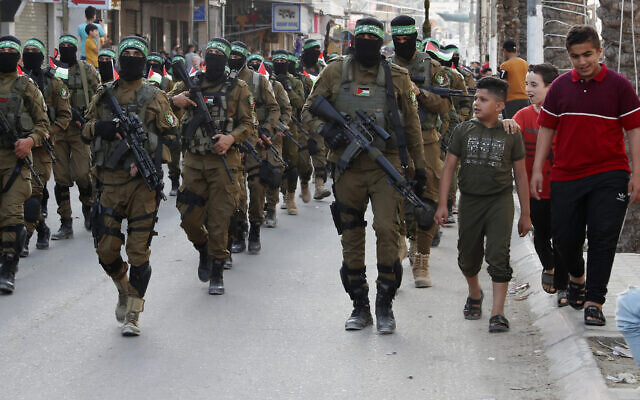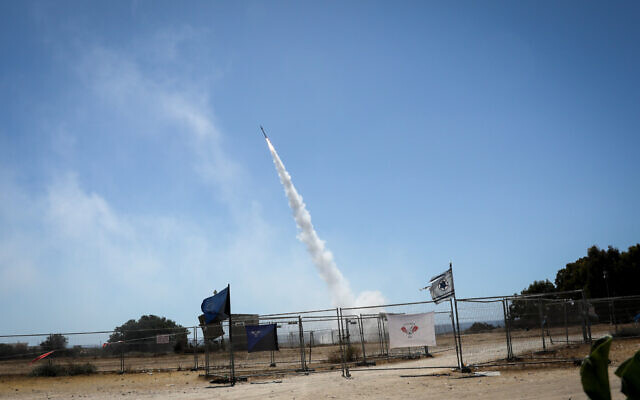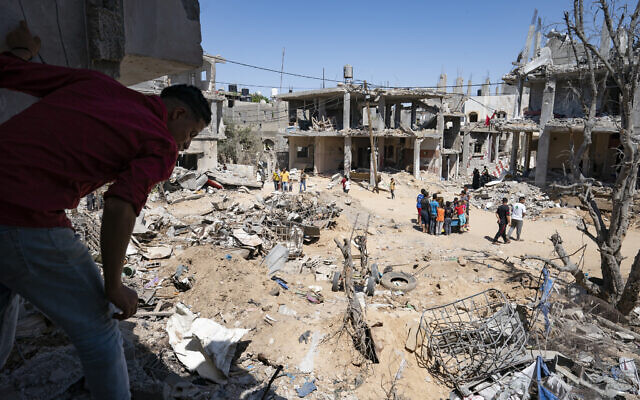
Gaza terror groups threaten ‘escalation’ as progress reported in Qatari aid deal
Palestinians to protest Saturday near border fence with Israel, despite apparent advances in ceasefire talks between Israel and Hamas
By Aaron BoxermanToday, 1:50 am
Palestinian factions in Gaza said on Wednesday that they were prepared to “escalate” hostilities against Israel unless restrictions on the enclave were loosened and announced a protest Saturday near the border fence.
“An explosion and escalation are inevitable if the status quo persists. The weak Zionist government must realize the price of its continued existence is ending the aggression against the West Bank and Jerusalem and ending the siege on Gaza,” senior Islamic Jihad official Khalid al-Batsh said in a statement.
After a Wednesday meeting, Gaza factions also announced that they would begin “a series of activities” to increase the pressure on Israel. In statements following the meeting, officials said they would hold a mass gathering in Malika camp on Saturday afternoon close to the security fence with Israel.
Malika was a key site of protests against Israel near the Gaza border fence in 2018 and 2019. The demonstrations, many of which saw violent clashes between terror group members and Israeli soldiers, left hundreds of Gazans dead.
Tensions between the two sides have been mounting again in recent weeks, propelled by an apparent lack of immediate progress in ceasefire talks to allow Gaza to rebuild following the 11-day conflict in May. On Monday, southern Israel was hit with the first rocket fire since the May round of fighting between Israel and Hamas.

Israel did not respond to Monday’s rocket fire in its unusual manner of striking Hamas targets inside the Gaza Strip. Nonetheless, without an agreement to facilitate Gaza reconstruction, observers say a future escalation of hostilities is inevitable.
Israeli officials have vowed they will not allow a return to the status quo, which they view as too favorable to the Hamas terror group that controls the enclave.
“There’s no going back to the way things were,” Prime Minister Naftali Bennett told the government shortly after assuming power in mid-June.Advertisement
One of the main points of contention has been over the future of hundreds of millions in subsidies that Qatar sends to the Gaza Strip. Since 2018, Qatar has provided over hundreds of millions of dollars to Gaza. Israel allowed the funds into the tightly blockaded enclave in exchange for quiet on its southern border.
The Qatari projects funded fuel for Gaza’s only power plant and hospitals to shore up the enclave’s damaged healthcare system. They also brought in hundreds of millions in cash payments to 100,000 poor Gazan families and to Hamas’s civil servants.
In the aftermath of the May fighting, Israel has sought to impose heightened restrictions on Gaza, significantly limiting imports and exports and largely halting the Qatari subsidies, all of which are essential to rebuilding the battered enclave.
During the war, Israeli airstrikes and Palestinian rockets caused at least $290 million worth of damage to the Gaza Strip, international assessors reported in early July.
The Israeli government has also sought to condition any easing of restrictions on progress in talks to reach a prisoner exchange with Hamas. The terror group currently holds two Israeli civilians, as well as the bodies of two Israeli soldiers. Hamas hopes to swap them for thousands of Palestinian prisoners in Israeli jails.
Both sides, however, are said to be closing in on a deal. Qatar and the United Nations have reached a tentative agreement that would see some of the Qatari subsidies return to the Gaza Strip, a diplomatic source told The Times of Israel
Previous announcements by officials that serious progress had been made in the ongoing talks were not borne out, however. A proposed deal between Ramallah and Doha to facilitate the funds through Palestinian Authority banks apparently fell through.
The current proposed framework does not include the Palestinian Authority. It would instead involve e-cards issued by the UN to 100,000 poor Gazan families, rather than suitcases of Qatari cash.

Nor would the planned deal include payments to Hamas’ employees in Gaza, one of the key stumbling blocks to any potential agreement.
It is unclear how the UN framework would overcome the concerns of Palestinian banks. The Palestinian Authority’s attempt to sign a deal with Qatar to fund the impoverished Gazans apparently collapsed when PA banks registered sharp opposition, fearing international sanctions if they paid out funds to families linked to Hamas.
But a senior Israeli security official reportedly expressed optimism on Wednesday that a final deal could be made to allow the Qatari cash into the Gaza Strip in the coming days, according to the Kan public broadcaster.
Israel also lifted some restrictions on Gaza beginning on Sunday, allowing in the import of tires and some other goods, according to Israeli and Palestinian officials. Over 1,350 Gazan businessmen were also allowed to cross into Israel on Wednesday for the first time since the beginning of the coronavirus pandemic.
No comments:
Post a Comment